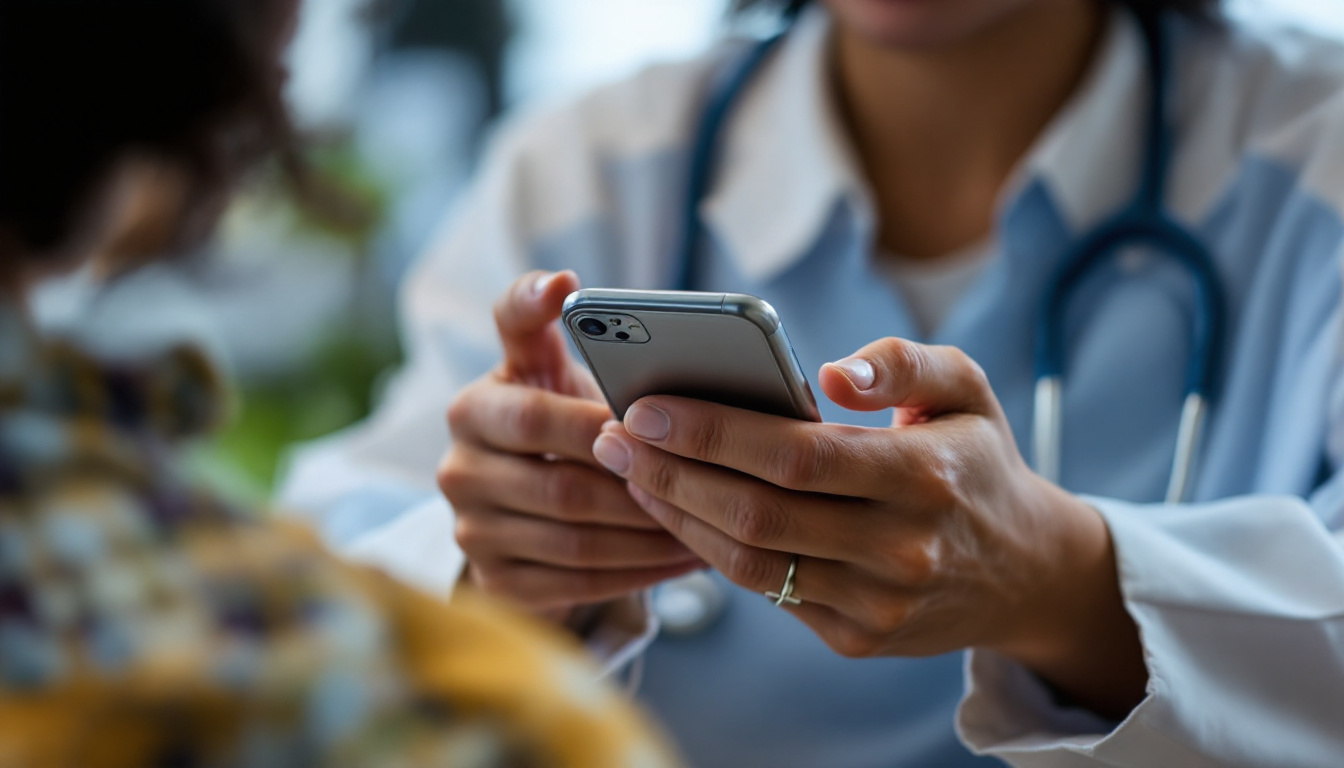The landscape of healthcare communication is undergoing a significant transformation, largely driven by advancements in technology. Among these innovations, Rich Communication Services (RCS) has emerged as a powerful tool that promises to enhance patient interactions, particularly in the realm of virtual consultations. This article delves into the importance of RCS Business Messaging in healthcare settings, exploring its various facets and its potential to revolutionize patient communication.
Understanding RCS Business Messaging
The Basics of RCS Business Messaging
Rich Communication Services (RCS) represents a next-generation messaging protocol that elevates traditional SMS to a more interactive and feature-rich platform. It allows businesses, including healthcare providers, to send enhanced messages that can include images, buttons, cards, and even links to web pages. This makes communication more engaging and informative, creating a richer experience for the end-user.
RCS is designed to work seamlessly on smartphones, leveraging its internet connectivity to offer a wide range of functionalities. Unlike SMS, which has character limits and lacks visual elements, RCS enables healthcare providers to share detailed information regarding appointments, reminders, and health tips directly to patients. This can lead to improved understanding and adherence to medical advice. For instance, a healthcare provider can send a visually appealing reminder for an upcoming vaccination, complete with a clickable link for rescheduling, thus enhancing the likelihood of patient compliance.
The Role of RCS in Modern Communication
In today’s fast-paced world, effective communication is crucial in maintaining a competitive edge in any industry, healthcare included. RCS Business Messaging plays a vital role in modern communication strategies by enabling real-time interaction between healthcare providers and patients. This technology allows for more personalized and efficient exchanges, making it easier for patients to ask questions and receive timely responses.
Moreover, RCS facilitates two-way communication, which is essential for gathering patient feedback and enhancing service delivery. The ability to engage patients through interactive messages can lead to improved patient satisfaction and stronger loyalty toward healthcare providers. As the industry shifts towards more patient-centered care, RCS is poised to be a key component of this transformation. For example, healthcare organizations can utilize RCS to conduct surveys post-appointment, allowing patients to provide immediate feedback on their experience. This not only helps providers improve their services but also empowers patients by making them feel heard and valued in their healthcare journey.
The Intersection of RCS and Healthcare
The Need for Virtual Consultations in Healthcare
The COVID-19 pandemic has accelerated the adoption of virtual consultations across the healthcare industry, creating a necessity for reliable and efficient communication tools. Patients now demand the convenience of connecting with their healthcare providers from the comfort of their homes. This shift illustrates the importance of leveraging innovative technologies like RCS to facilitate virtual appointments and follow-ups.
Virtual consultations not only provide convenience but also increase access to healthcare, particularly for patients in rural or underserved areas. The integration of RCS in these scenarios ensures that communication is clear, secure, and efficient, leading to better health outcomes. By enabling real-time updates and information sharing, RCS helps healthcare providers stay connected with their patients, making it an invaluable asset in modern healthcare. Furthermore, the ability to conduct virtual consultations reduces the burden on healthcare facilities, allowing them to allocate resources more effectively and focus on critical cases that require in-person attention. This shift not only optimizes operational efficiency but also enhances the overall patient experience by minimizing wait times and improving service delivery.
How RCS Enhances Patient Communication
RCS offers multiple features that enhance patient communication, making it a valuable tool for healthcare providers. For example, providers can send rich notifications about upcoming appointments, medication reminders, and even educational materials on managing their health conditions. This multidimensional approach allows patients to receive comprehensive information without feeling overwhelmed.
Additionally, RCS supports interactive elements such as buttons, which can streamline processes such as confirming an appointment or accessing telehealth services with just a tap. This level of engagement can significantly improve the patient experience and increase participation in their healthcare journey. Moreover, RCS can facilitate two-way communication, allowing patients to ask questions and receive prompt responses from their healthcare teams. This immediate feedback loop not only empowers patients but also fosters a sense of trust and collaboration between them and their providers. As healthcare continues to evolve, the integration of RCS into patient communication strategies will be crucial in ensuring that patients feel supported and informed throughout their care process.
The Revolution in Patient Communication
The Shift from Traditional to Digital Communication
As communication evolves from traditional methods to digital platforms, healthcare is no exception. The shift towards digital communication is driven by the need for efficiency, accessibility, and convenience. RCS serves as an integral part of this transition by providing a platform that is more versatile than standard messaging services. Unlike conventional SMS, RCS allows for richer media, enabling healthcare providers to send images, videos, and even interactive buttons that can guide patients through various processes, such as scheduling appointments or accessing educational materials about their conditions.
The ability for healthcare providers to engage patients in real-time through RCS cultivates a more proactive approach to patient care. Patients who feel heard and supported are more likely to adhere to treatment plans and participate in their healthcare decisions, ultimately leading to better health outcomes. This shift not only empowers patients but also encourages them to take ownership of their health journey, fostering a collaborative environment where both parties work towards common goals.
The Impact of RCS on Patient Engagement
RCS enhances patient engagement by facilitating better interaction and clearer communication. With the ability to send interactive messages, healthcare providers can create tailored experiences for patients that resonate with their individual needs. This personalized communication model fosters trust and strengthens the provider-patient relationship. For instance, reminders for medication can be customized with specific times and motivational messages, making it easier for patients to stay on track with their treatment plans. Moreover, the interactive nature of RCS allows for quick feedback loops, enabling patients to ask questions or express concerns without the barriers often associated with traditional communication methods.
Furthermore, the data collected through RCS interactions can be invaluable for healthcare providers. By analyzing patient responses and engagement levels, organizations can adapt their communication strategies to suit their patients’ preferences, leading to higher overall satisfaction and enhanced health management. This data-driven approach not only helps in refining patient outreach but also aids in identifying trends and potential areas for improvement in patient care. As healthcare continues to embrace digital transformation, the insights gained from RCS interactions will play a pivotal role in shaping future healthcare communication strategies, ensuring that they remain relevant and effective in meeting the evolving needs of patients.
The Future of RCS in Healthcare
Potential Advancements in RCS Technology
The future of RCS in healthcare is promising, as continuous advancements in technology are anticipated to enhance its capabilities further. Innovations may include advanced analytics for better insight into patient behavior, automated responses powered by artificial intelligence, and even integration with wearable health devices. These developments will not only streamline communication but also facilitate proactive health management, allowing healthcare providers to anticipate patient needs and intervene before issues escalate.
Such advancements will enable healthcare providers to deliver more accurate and timely information, allowing them to respond to patient inquiries in real-time. Imagine a scenario where a patient receives reminders about medication schedules or follow-up appointments directly through their messaging app, complete with interactive buttons for easy responses. As RCS technology continues to evolve, it will likely become an indispensable tool in the arsenal of healthcare communication strategies, driving a shift towards more efficient, effective, and patient-centric care. The potential for personalized communication, tailored to individual patient preferences and histories, is particularly exciting, as it could lead to more engaged patients who feel supported throughout their healthcare journey.
The Long-term Benefits of RCS for Patient Care
Implementing RCS Business Messaging in healthcare is not just a trend; it represents a long-term strategy for improving patient care. By prioritizing clear and engaging communication, healthcare providers can enhance patient satisfaction, reduce no-show rates for appointments, and promote better health outcomes. Furthermore, RCS can facilitate educational initiatives, enabling providers to send out health tips, preventive care information, and wellness resources directly to patients, fostering a culture of health awareness and proactive engagement.
Ultimately, the integration of RCS in healthcare is designed to create a seamless communication experience that benefits both providers and patients. This technology can bridge the gap between in-person visits and digital interactions, ensuring that patients feel connected and informed at every stage of their care. As healthcare continues to evolve in response to the needs of the population, incorporating innovative technologies like RCS will be crucial in enhancing patient care and satisfaction, solidifying RCS as a central component of future healthcare communication strategies. The ability to track patient responses and engagement metrics will also empower healthcare organizations to refine their communication approaches, ensuring that they meet the diverse needs of their patient populations effectively.
Take the Next Step in Revolutionizing Your Patient Communication
Ready to elevate your healthcare communication with RCS Business Messaging? nativeMsg, the RCS Business Messaging Creator, is here to transform your patient interactions into interactive experiences. With our easy-to-use drag-and-drop interface, you can create engaging campaigns that resonate with your audience and drive better health outcomes. Experience up to 300% higher engagement and streamline your communication strategy today. Get Started with nativeMsg and see the difference for yourself.



